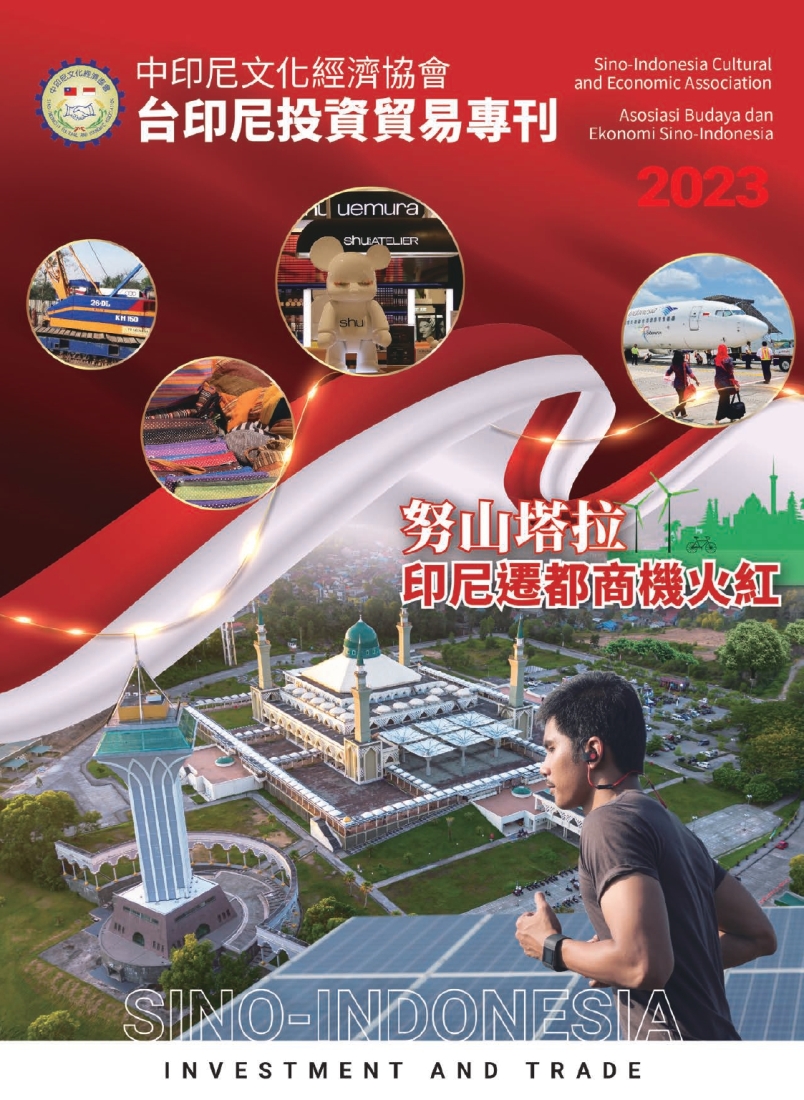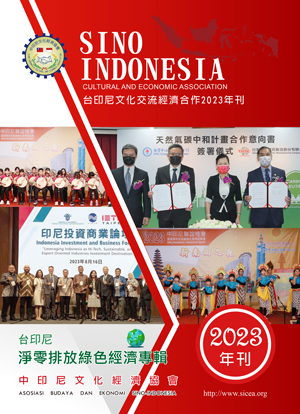期刊文獻
Robert James:對台印尼雙邊經貿交流有信心
作者:文■周伶繁、方文章整理
專訪駐台北印尼經濟貿易代表處代表 Robert James Bintaryo印尼為新興市場,人力豐 沛,人口結構穩定。因 此,印尼對於台灣的產品與投資極富市場潛力。駐台北印尼經濟貿易代表處代表羅伯詹姆斯(Robert James Bintaryo)表示,兩國近來頻繁的商業往來與積極交流將能帶動雙邊貿易成長。截至2016年5月,雙邊貿易額已達29.1億美元。
目前政府正全力推動新南向政策,駐台北印尼經濟貿易代表處也將致力於加強臺印兩國的經濟發展與貿易合作,因此本刊特別對羅伯詹姆斯代表進行專訪。
問:您對印尼和台灣之間的 投資和貿易趨勢有何看法?
答:台灣是印尼的主要合作夥伴之一,在過去5年,台灣積極投資印尼,而印尼也成為台灣第7大投資國,而台灣也是印尼的第13大外資國,總投資額達16億美元,投資項目達1,029個;該數字只是從台灣直接投資到印尼,如果計算台灣從第3國投資的話,金額將不只這些,會更多。我堅信,印尼和台灣之間的經濟合作,特別是在投資和貿易方面,未來將會有更好的發展。
問:您認為印尼對台灣的潛 在投資吸引力為何?
答:印尼的國內生產總值達896億美元,占東協經濟的42%。印尼人口逾2.6億,占東協總人口的41%。印尼勞工人口124億,占東協就業人數的44%。另外,印尼中產階級人口達6,000萬,占東協中產階級的34%。
因此,台商看待印尼應不只是一個市場而已,它也是東協市場的一個生產基地。就投資而言,投資誘因除當地需有良好基礎之外,其國內市場的規模也很重要。而印尼是東協的最大市場,台商可以利用印尼市場為基礎,進而擴大至東協、亞洲及全球。
印尼與60多國建立經濟夥伴關係和自由貿易協定,包括:中國大陸、東南亞、印度、巴基斯坦及日本。目前,我們準備加入跨太平洋夥伴關係和印尼-歐盟CEPA。
問:就印尼和台灣間的投資 和貿易,您的看法如何?
答:過去幾年,駐台北印尼經濟貿易代表處收到台商許多不同產業的貿機詢問,產品涵蓋橡膠製品、紡織品、海鮮產品、漁業、咖啡、加工食品、精油、煤、蔬菜、家具、香料及其他產業。
在2016年,亮點詢問產品包括海鮮、煤炭、家具及原材料;當然,還包括咖啡。目前,喝咖啡已成為台灣忙碌生活中的重點趨勢。許多廠商,不僅是做咖啡買賣,也是咖啡的專業烘焙者,他們進口生豆來烘焙,其中以阿拉比卡(Arabica)咖啡豆最受歡迎。台灣的咖啡消費者要的是頂級咖啡,他們可以泡出真正美味的咖啡。我們也觀察到,將有越來越多的台灣廠商進口印尼產品。除咖啡外,魚及海鮮類產品自2015年以來,也有越來越多的廠商進口。為了促銷印尼的海鮮產品,駐台北印尼經濟貿易代
表處一直積極參與在高雄舉辦台灣國際漁業和海產品專業展,因為我們認為這是讓印尼產品可以在台灣市場曝光的最積極方式,也是讓印尼產品直接與台灣進口商接觸的方式。
問:印尼的未來發展計畫為 何?台商有什麼商機及合作 機會?
答:我們建議在鋼鐵和石化行業、ICT製造業、旅遊業和海事業等方面的合作。鋼鐵和石化業非常重要,它們是工業之母,能提高國家的工業能力,並推升其他產業的發展。因此,我們需要該等產業的大量投資。
另外,我們也歡迎ICT製造業的投資,台灣在這方面很強,能帶動印尼數位經濟的發展。印尼的數位經濟仍在持續成長中,2015年的網購收入高達180億美元,約成長40%,預估到2020年將達1,300億美元。同年印尼的數位消費者達590萬人,成長28%;行動電話件數達3.263億件,遠大於印尼的人口數。印尼網路用戶數在2015年達8,810萬戶,成長15%;不過,社交媒體用戶在2015年也達到7,910萬戶,成長10%。
在觀光方面,目前我們正積極開發10個國家旅遊戰略區域,我們稱之為10個新巴厘島計畫,其中一個是位於馬魯古北部Morotai島的特別經濟區(SEZ),位於印尼東部,距新加坡和台北有3小時的航程,是極具旅遊潛力的島嶼,擁有自然美、海洋、熱帶氣候和歷史文化,是極具吸引觀光客的地方。在該區有很多投資機會,不僅是旅遊和基礎設施,在漁業、物流和農業也很有發展性。
旅遊業對印尼來說,是國家發展的重要產業之一,攸關就業機會、基礎建設發展及地方收入。
儘管全球發生了好幾次危機,但印尼的國際遊客數量仍是正成長。2015年,印尼旅遊業對印尼的GDP貢獻了10%。預估2019年,旅遊業對GDP的貢獻將達15%,並創造1,300萬人的就業機會。事實上,印尼政府已採取許多改善旅遊的措施,這可由印尼旅遊業在2015年成長10.3%,便可證明。該數字高於東協旅遊業5.1%的成長率,印尼的旅遊和旅遊競爭力排名也從2013年的第70名提升到2015年的第50名。
在海運方面,對台灣而言也有很多機會。2015-2019年,印尼需要約1,500艘船隻來推動海運的發展,相當於134億美元。這是一個大數字,可創造很多相關的投資機會。台商可以參與這方面的投資,例如鋼鐵工業、造船工業、船舶機械和電子業等。韓國、英國及中國大陸等,都有投資,台灣在這方面有競爭優勢,應該參與投資。
問:快速成長的東協市場, 彼此國家間變得越來越緊 密,成為亞洲經濟成長主 力。依您看,在此趨勢下, 台灣是否會被邊緣化?以及 對台灣新政府的「新南向政 策」有什麼建議和意見?
答:台灣絕對可以在東協扮演重要角色。與世界其他國家相比,台灣的新南向政策起步較晚,以美國、日本、澳大利亞、韓國及中國大陸,他們在東協已活躍多年。台灣得快點趕上,不然在東協的工業及經濟優勢將逐漸消失。為趕上其他國家,台灣應有所作為,例如鼓勵企業南向,提供金融貸款,加強與當地業界的合作等。
問:台灣和印尼間的商業及 文化差異為何?台灣與印尼 的企業在進入對方市場時, 應注意那些事項?
答:在台灣,與印尼在商業和文化習俗上確實有許相異之處。
例如,在台灣拜訪公司時,會帶禮物,是一種習慣與禮貌,但在印尼,就不會這麼做。另外,印尼人很重視準時的觀念。在商場上,在與台灣企業打交道時,不難發現大部分台灣商人不只是尋找做生意的機會而已,他們同時也在建立企業間的良好關係與彼此的信任度。不過,有時我們也會收到一些負面訊息,例如台商害怕與印尼人合作,是因為缺乏彼此的信任與溝通,以及害怕印尼合夥人會無預警的突然消失。
問:你覺得在台灣的生活如 何?你喜歡什麼,以及不喜 歡什麼?請分享一些個人經驗。
答:在台灣生活3年多來,對我而言是很好的體驗。台灣有良好的基礎設施、寬闊的道路、較少的塞車、很好的醫療服務、還有可以慢跑及放鬆心情的公園,以及擁有安全及舒服的環境。不過,對信奉穆斯林教及須清真產品Halal認證的印尼人來說,情況就有些糟,因為在台灣的穆斯林人是少數,台灣整體環境並未針對清真產品作分類,這對信奉穆斯林教的人來說,是一項挑戰。
然而,所幸的是台灣政府正在釋出善意,擬聚焦於吸引穆斯林觀光客,計劃增加清真產品、餐廳或創造一些使台灣成為一個穆斯林友好國家的環境。
Robert James Bintaryo, Rep. of IETO, Has Faith in Strong Economic Cooperation between Taiwan and Indonesia
Indonesia, as an emerging market with huge labor force and stationary population pyramid, has huge market potential for Taiwan products and investments. The frequent interaction between businesses and active promotion recently, Robert James Bintaryo, Representative of Indonesian Economic and Trade Office to Taipei, said, would boost the bilateral trade which has already recorded $2.91 billion until May 2016. The new government of Taiwan is promoting "New Southbound Policy", and the Economic and Trade Office in Taipei, Indonesia will also be committed to strengthening the economic development and trade cooperation between Taiwan and Indonesia. We are honored to have an exclusive interview with honorable Representative Robert James Bintaryo as follows. Q:What is your observation about the investment and trade trend between Indonesia and Taiwan? A:Taiwan is one of Indonesia’ s main partners. In the last five years, Taiwan actively invested in Indonesia, placing it as the 7th largest country receiving investment from Taiwan. In the same period, Taiwan ranked the 13th largest country investing in Indonesia amounted to US$ 1.6 billion with 1,029 projects. This figures only direct investment from Taiwan to Indonesia, if we calculate also Taiwanese investment from third countries, indeed there are more investment from Taiwan to Indonesia. I strongly believe that economic cooperation between Indonesia and Taiwan, especially in the field of investment and trade, will be well developed in the near future. Q: What do you think is the attraction of Indonesia for Taiwan’s potential investment? A:Indonesia’s GDP amount to US$896 Billion, representing 42% of ASEAN economy. The population is over 260 Million, 41% of the entire population in ASEAN. The number of workers in Indonesia 124 Million, representing 44% of total employment in ASEAN. The number of middle class in Indonesia reaches 64 Million, representing 34% of the middle class in the ASEAN. Taiwanese entrepreneurs should see Indonesia not only as a market, but also as a production base for ASEAN market. For investment, investor needs good foundation which is usually relying on the domestic market. Indonesia is the biggest market in ASEAN. Taiwanese investor can utilize Indonesian domestic market as a solid foundation, and then can expand the production capacity for ASEAN, ASIA, and even world market. For your information, Indonesia established economic partnerships and free trade agreements with more than 60 countries, including the world’s largest markets: China, Southeast Asia, India, Pakistan, and Japan. We are preparing to join the Trans Pacific Partnership and the Indonesia-EU CEPA. Q: What is your observation about the investment and trade between Indonesia and Taiwan? A:For the past years, based on the inquires that IETO in Taipei has received from numerous Taiwan companies, there were loads of different types of products for instance: rubber products, textile, seafood, fisheries, coffee, processed food, essential oils, coal, vegetables, furniture, spices and many other types of commodities. For this year itself, the main highlight of those inquiries that we have received the most are seafood products, coal, furniture, diversity of raw materials and of course coffee. Drinking coffee has becoming one of the trends in the busy life in Taiwan. A lot of the exporters, not only from trading companies but also from professional coffee roasters demanding for green bean coffee from Indonesia specifically Arabica. Coffee consumers in Taiwan are truly looking for premium products where they could extract the real taste of coffee. We observe that they will be more and more coffee importers in Taiwan. Not only coffee, fisheries and seafood products since last year until present there are more importers for these products. To promote our seafood products, IETO has actively participate in Taiwan International Fisheries and Seafood Show in Kaoshiung, as we believe this is the aggressive way to get the exposure in the market as well as to promote our products to directly meet Taiwan importers for these products. Q:What is future development plan of Indonesia? What business and cooperation opportunity for Taiwanese companies? A:We suggest ICT manufacturing because Taiwan is really good at it and it is related to digital economy in Indonesia. Indonesia Digital Economy continues to grow.
Robert Online sales in 2015 received up to US$18 billion or grows around 40%. And it is predicted to reach 130 billion dollars by 2020. Consumer digital in Indonesia in 2015 reached 5.9 million, grew 28%. Mobile phones in Indonesia reached 326.3 million pieces, larger than the population of Indonesia. Active internet users in Indonesia in 2015 reached 88.1 million, grew by 15%. While active social media users in 2015 reached 79.1 million, grew by 10%. We are now aggressively developing and promoting the 10 National Tourism Strategic Area, or we called it 10 New Bali, one of which is a Special Economic Zone (SEZ) Morotai in North Maluku. Morotai Island located in eastern Indonesia, 3 hour flight from Singapore and Taipei, the island also has great potential for tourism. The natural beauty, marine, tropical climate, and history are a tourist attraction in Morotai. There are many investment opportunities to develop Morotai, not only tourism and infrastructure, but also in fisheries industries, logistic and agriculture. Recently, for Indonesia, tourism is one of the keys for development. It is a key factor for job creation, infrastructure development, and local income generation. Despite several global crises, the number of international tourists remain growing . In 2015, Indonesia´s tourism industry contributes 10% of Indonesia’s GDP. In 2019, the contribution of tourism to GDP is expected to reach 15% with a contribution to employment of 13 million people. Many policies have been undertaken by our government to improve tourism industry. Proven by the Indonesia’s tourism growth in 2015 that reach 10.3%, that figure is above the ASEAN tourism growth that only 5.1%. Also Indonesia’s travel and tourism competitiveness ranking jumped from 70th in 2013 to 50th in 2015.
There are plenty of opportunities for Taiwan in regard to maritime. From 2015 to 2019 Indonesia needs around 1.500 ships to support maritime sector, that is equivalent to US$13,4 billion. This is a big number and indeed creates a lot of opportunities for investment. Especially for Taiwan, Taiwan can take part in investment that related to maritime sector, for example in steel industry, shipbuilding industry, machinery and electronics for ship. There are many countries such as South Korea, UK and China investing in Indonesia in this sector. Taiwan should take part too since they have the competitive advantage in this sector.
Q:The rapidly growing ASEAN market, as the main driver for Asia’s economic growth, has becoming more and more bound together. In your opinion, is there any chance that Taiwan will be marginalized due to this trend? What are your suggestions and remarks on Taiwan’s new government’s “New Southbound Policy”in face of the ASEAN trend?
A:Taiwan definitely can take an important role in ASEAN. Taiwan’ s new southbound policy is getting a late start compared with other countries in the world, for example US, Japan, Australia, South Korea and China have been active in the region for many years. If Taiwan does not catch up quickly, the nation’s industry and economic advantages in ASEAN would gradually erode. To catch up with other countries, there are a lot of things that Taiwan should do, for example giving incentives for companies who invest to the South i.e. financial loan, and also intensify cooperation with local business community from both sides.
Q:How do you compare between business and cultural
practices between Taiwan and Indonesia? What differences should companies be aware of when entering each other’ s market? (Taiwan to Indonesia and Indonesia to Taiwan)
A:There are many differences in business and cultural practices in Taiwan. For example, bringing gifts during company visits where Indonesians do not practice this culture. Other examples such as: being on time which is one of the concerns that Indonesians should take it seriously. Also, in dealing business with Taiwanese, majority of them is not looking for just doing business only; however, they need a good relationship to build trustworthiness between the two or more companies they are partnering with. On the other side, some complaints that we have gotten, Taiwanese companies tend to be afraid to corporate with Indonesia, due to lack of trust, miscommunications, disappearing without notice.
Q:How do you feel about living in Taiwan? What do you like and dislike? Please share some personal experiences.
A:Livings in Taiwan for more than three years have been a great experience for me. Taiwan has good infrastructure, wide roads, less traffic jam, great medical services, parks to relax or to jog, safe environment and many other surrounding elements that provoke me live comfortably here. However, there are also some complications for Muslim religion people where we demand Halal products which could be categorized as a challenge due Muslim is minority in this country. Yet the great thing is, people are nice to each other; moreover, the government is currently eyeing on Muslim tourists where there are planning to increase the number of Halal products, restaurants or other aspects to make Taiwan as a Muslim-friendly country.




